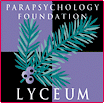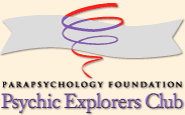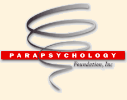 |
 |
| THE BIOGRAPHICAL DICTIONARY OF PARAPSYCHOLOGY PAUL STEVENS This autobiography was written for the PF Lyceum Blog #11, “Lives in Parapsychology.” A more formal biography will be posted in the coming months. Paul Stevens, Ph.D.  My interest in parapsychology started young as the result of a children’s television series called “The Tomorrow People” (which has recently been released on DVD, much to my delight!). This was a science fiction story about a group of children who were the next stage in human evolution and who were telepathic, clairvoyant and could heal. Even better, they could also teleport (or “jaunt” as it was known, which incidentally is a term taken from another highly recommended SciFi book called The Stars My Destination by Alfred Bester). This led to an interest in other SciFi, especially that which dealt with psi effects. I also became interested in some areas of paganism (which is either seen as being a modern day interpretation of traditional spiritual systems or as a New Age invention, depending on your viewpoint), especially where it was claimed that psi effects and related abilites were a common part of such belief systems. My interest in parapsychology started young as the result of a children’s television series called “The Tomorrow People” (which has recently been released on DVD, much to my delight!). This was a science fiction story about a group of children who were the next stage in human evolution and who were telepathic, clairvoyant and could heal. Even better, they could also teleport (or “jaunt” as it was known, which incidentally is a term taken from another highly recommended SciFi book called The Stars My Destination by Alfred Bester). This led to an interest in other SciFi, especially that which dealt with psi effects. I also became interested in some areas of paganism (which is either seen as being a modern day interpretation of traditional spiritual systems or as a New Age invention, depending on your viewpoint), especially where it was claimed that psi effects and related abilites were a common part of such belief systems.
But this all remained more as a hobby than as a career plan. Despite reading a lot of popular books on the subject, I wasn’t really aware of the academic literature on parapsychology or that there were university researchers in the UK. So my career plan revolved around my other love: astronomy. In 1989, I started an undergraduate degree in Astronomy at University College London, delving into the physics of stars, planets and the universe in general. However, as I was still very interested in parapsychology — my second year project was on corona discharge, the physical effect underlying Kirlian Auras — so I decided to start up a university parapsychology society. At the very first meeting, a second year student called Tony Lawrence talked to me and told me that he was due to start a PhD with the Koestler Parapsychology Unit (KPU) at the University of Edinburgh after his degree was complete. This was the first time I had heard of the KPU, but that meeting led me to write to the Professor, Robert L. Morris (then holder of the Koestler Chair of Parapsychology), and detail a research thesis looking at some biophysical aspects of psi effects. So, after completing my degree, I came to Edinburgh and in 1997 completed a PhD under the supervision of Professor Morris. During the PhD, I was also fortunate to be awarded a Summer Research Fellowship at the University of Nevada, Las Vegas, which as well as showing me a city that should itself be classed as “paranormal” (nowhere should ever be that hot!), gave me the opportunity to meet many of the USA parapsychology researchers. After the PhD, I stayed on with the KPU as a Research Fellow thanks to a series of successful funding applications, and now am supervising PhD students myself. Although the my specific interests have changed over time, they are still broadly the same as when I first started my PhD: I want to know more about what psi effects actually are. Although we talk about telepathy or psychokinesis as if we understood the phenomena, we don’t actually know how they work, or even what we really mean by those terms. Over the years, my research has been aimed at trying to question the assumptions we make as parapsychologists and see whether there are other ways of understanding what are usually seen as our “basic” phenomena. For example, the Ganzfeld ESP studies tend to assume that it is information about the Target video which is somehow transferred from “Sender” to “Receiver” (or possibly directly from the Target to the “Receiver”). Some of my work has questioned this assumption, trying to understand whether, if we take other aspects of the system into account (such as the amazing imaginative power of the human brain and the complex communication allowed by conventional sensory feedback), any psi communication between the two people might actually be much simpler and yet still give the same results. Following on from this approach, a lot of my research has focussed on the effects on human behaviour of very weak, low frequency magnetic fields. I have studied the effects of the Earth’s magnetic field on psi experiences, changed the way people perceive emotional pictures by sitting them in a room with magnetic coils embedded in the walls, looked for differences in the background magnetic fields of sites thought to be haunted and non-haunted “control” sites, and examined in more detail the brain activity that occurs when people are stimulated either by weak magnetic fields or by a person sending emotional thoughts from another room. All part of everday work for a parapsychologist! Compared to other researchers in the field, I have been very fortunate in that I have been continuously employed for the last 8½ years as a full-time parapsycholgy researcher in the same laboratory. This is unfortunately rare. To do this, I have had to continuously find external funding, constantly extending my contract as a Research Fellow from year to year. Although I love the research itself, the lack of any job security and the constant need to find more money for salary and equipment can be very stressful: parapsychology is not an easy option. On top of that, you often find that there will be no one around you with the relevant skills you need to carry out a piece of research — this is particularly a problem if you are, as I am and as parapsychologists often have to be, working on multidisciplinary research. You then have to spend the time developing that skill yourself, often borrowing techniques from a variety of different areas, cobbling them together and hoping it will work the way you want it to! Stressful, yes, but strangely this is also one of the reasons that parapsychology is so intriguing and, in many ways, satisfying: you are exploring areas that are all too often neglected by other areas of science. Even by the end of your PhD, you are likely to be the expert in your subject as no one will have looked at it in quite the same way as you have (if at all). Ultimately, whether you think parapsychology represents a slight anomaly that will eventually be fitted into mainstream science or that it is the cutting edge of a new paradigm that will revolutionise our understanding of what it is to be human, you know that you are, in your own small way, helping to better understand the universe we live in. No scientist can hope to do more. Roe, C., Davey, R. & Stevens, P. (2003). Are ESP and PK aspects of a unitary phenomena? Journal of Parapsychology, 67, 343–366. Stevens, P. (2005). The effect of weak magnetic fields on a random event generator: reconsidering the role of geomagnetic fluctuations in microPK studies. European Journal of Parapsychology, 20(2), 135–149. Stevens, P. (2004). Experimental evaluation of a feedback-reinforcement model for dyadic ESP. Journal of Parapsychology, 68, 65–92. Stevens, P. (2002). Can we differentiate between ESP and Imagination? Journal of the Society for Psychical Research, 66(4), 239–246, Stevens, P. (2001). Effects of 5s exposures to a 50 µT, 20 Hz magnetic field on skin conductance and ratings of affect and arousal. Bioelectromagnetics, 22, 219–223. Stevens, P. (2000). Human electrodermal response to remote human monitoring: Classification and analysis of response characteristics. Journal of Parapsychology, 64, 391–409. Stevens, P. (2000). Noise, physics and psi: new ideas for research. International Journal of Parapsychology, 11, 63–72. Stevens, P. (1999). Remote psychokinesis. European Journal of Parapsychology, 14 68–79. Stevens, P. (1998). Techno-Dowsing: Developing a physiological response system to improve psi training, Journal for Scientific Exploration, 12(4), 551–568. Wiseman, R., Watt, C., Stevens, P., Greening, E., & O’Keeffe, C. (2002). An investigation into the alleged haunting of Hampton Court Palace: Psychological variables and magnetic fields. Journal of Parapsychology, 66, 387–408. ********* Biography of Stevens on the University of Edinburgh, Department of Psychology website |
 |

|
 www. parapsychology. org |
||